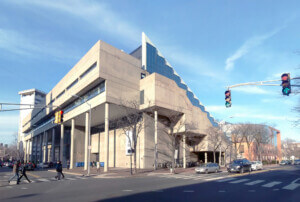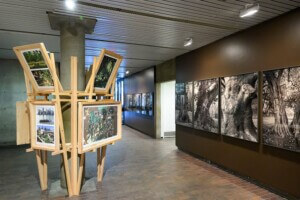The Harvard Graduate School of Design (GSD) has announced the finalists for the 2023 Wheelwright Prize: Jingru (Cyan) Cheng, Maya Bird-Murphy, Isabel Abascal, and DK Osseo-Asare. The annual Wheelwright prize was created in 1935 in memory of Arthur W. Wheelwright. Each year it is awarded to an individual taking on original architectural research that shows potential to make a significant impact on architectural discourse. In past years, winning projects have included the potential of seaweed, shellfish, and the intertidal zone to advance architectural knowledge and material futures; how spaces have been transformed through the material contributions of the African Diaspora; and new architecture paradigms for storing data that can reimagine digital infrastructure.
The first of this year’s finalists, Jingru (Cyan) Cheng, works across the fields of architecture, anthropology, and film making. She typically follows drifting bodies, such as migrant workers or even forms of water, focusing on latent relationships and confronting social injustice and ecological crises. Cheng’s proposal titled Tracing Sand: Phantom Territories, Bodies Adrift dissects iconic sand sites that give form to spatio-cultural territories fueled by colonial globalization and high consumption. The aim of the project is to establish a reflexive framework for architecture towards a paradigm shift in the value system, posing the question: What does it mean to build today amid ecological crisis and social injustice?
Maya Bird-Murphy, is a designer, educator, and the founder of Mobile Makers, an award winning nonprofit organization dedicated to providing design and skill building workshops to underrepresented communities. Her proposal titled Examining Architectural Practice Through Alternative Methodology and Pedagogy aims to investigate the friction that exists between the traditional and alternative design practices, to document the nuances of individual practices, and to gather and share knowledge through architectural storytelling. The project analyzes how to accelerate systems change in the architecture field, and what United States–based firms can learn from alternative practices around the world, especially by taking a special interest in innovative methods to collect, store, and share open-source knowledge and stories that foster authentic connection and dialogue in the field.
The third finalist, Isabel Abascal, is a Mexico City–based architect and writer who founded the architecture studio LANZA Atelier alongside Alessandro Arienzo. (LANZA Atelier was recently one of eight design firms named in The Architectural League of New York’s 2023 Emerging Voices program.) In her proposal titled Mother Architecture: Shaping Birth, Abascal examines how rethinking architecture and spatial design can impact maternal mortality through case studies of matriarchal societies, home water-births, maternity centers from Pritzker Prize–winning architects, and floating hospitals. Based on statistics from the World Health Organization, Abascal proposes that the high number of maternal deaths in some areas of the world reflects inequalities in access to quality health services and highlights the gap between rich and poor, prompting her proposal to find accessible ways to avoid that inequality.
And last, but not least, DK Osseo-Asare, is a Ghanaian-American designer who makes buildings, landscapes, communities, objects, and digital tools, and a co-founding principal of the transatlantic architecture and integrated design studio Low Design Office (LowDo), based in Austin, United States; and Tema, Ghana. Osseo-Asare also holds an appointment in Humanitarian Materials at the Pennsylvania State University, where he directs the Humanitarian Materials Lab, a transdisciplinary research lab architecting materials for human welfare. His proposal titled Bucky in Africa: Remembering the Chemistry of Architecture seeks to decolonize the practice of architecture using a mixed methods approach of action research to investigate the African roots of “design science” from an architectural perspective. Osseo-Asares incorporates linguistics, archival research, fieldwork, and community-based making with academic and community partners across Africa, the Middle East and Europe in order to study the links between indigenous African technologies of design and established conventions of architectural production.
The winner of the prize is awarded a $100,000 prize to support the proposed research project, an invitation to lecture at the Harvard GSD, and the opportunity to publish research in a Harvard GSD publication. While a first-phase jury deliberated in April, a final winner will be announced in June.











